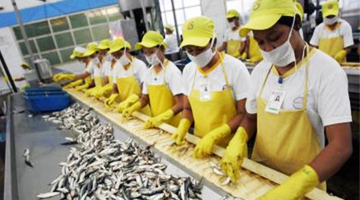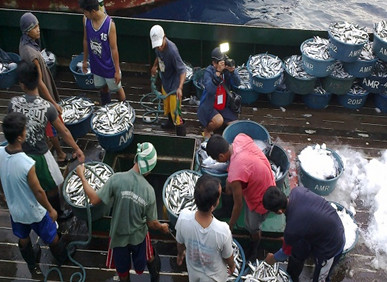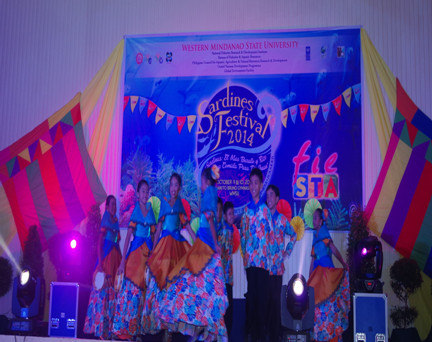 ZAMBOANGA CITY-About 50 fisherfolk attended the forum on alternative livelihood assistance held at the Executive Hall of the Western Mindanao State University (WMSU) during the Sardine Fiesta held recently.
ZAMBOANGA CITY-About 50 fisherfolk attended the forum on alternative livelihood assistance held at the Executive Hall of the Western Mindanao State University (WMSU) during the Sardine Fiesta held recently.
The forum sought to address the urgent concern on the possible three-month loss of livelihood for most of Zamboanga’s fisherfolk who depend on sardine fishing, due to the implementation of the joint Administrative Circular declaring a closed season for catching sardines in designated conservation area.
Jointly implemented by the Department of Agriculture (DA) and the Department of Interior and Local Government (DILG), through an administrative circular, the sardines closed season prohibits the killing or catching of any sardines in the conservation area which covers the East Sulu Sea, Basilan Strait and Sibuguey Bay.
The ban includes the selling, buying, or even merely possessing the said fish species.
A penalty of imprisonment for six months and one day to six years and/or fine of six thousand pesos, among other penalties, is imposed on violators of the said administrative circular.
Implemented since 2010 and run from November 1 to February 1, sardines’ peak spawning period, the fishing ban on sardines seeks to reproduce a large number of offspring that will grow to marketable size to increase the volume of the annual sardine catch to maximum sustainable yield, a much welcome development for a city dependent on the sardine industry especially for its canning factories.
The gains of the sardine close season in the Zamboanga Peninsula as reflected in the abundance of sardines and even other kinds of fishes in the area, proves that the three-month ban is a worthy and significant research and development initiative. Concerns and anxieties on its effects in the livelihood of the local fisherfolk, however was widespread, hence the urgency of the forum on alternative livelihood.
 Serving as resource persons during the forum were representatives from the Bureau of Fisheries and Aquatic Resources (BFAR) Region lX, and the Department of Labor and Employment (DOLE).
Serving as resource persons during the forum were representatives from the Bureau of Fisheries and Aquatic Resources (BFAR) Region lX, and the Department of Labor and Employment (DOLE).
Regional Director Ahadula Sajili and his staff explained the various community assistance projects provided by BFAR Region lX under its programs which can be availed of by the local fisherfolk as a form of alternative livelihood.
Among such assistance is the production and distribution of fish seeds; distribution of fishing gears and paraphernalia like gill nets and fish pots, hook and lines, non motorized banca and marine engines to selected marginal fisherfolk and their associations.
BFAR also provides input assistance for seaweed seedlings and seaweed farm and establishes post-harvest facilities such as smokehouse, elevated fish solar dryers, and seaweed stilt dryers as a form of assistance.
Being engaged in the reforestation of mangrove forests, BFAR representatives said that the Bureau is targeting more than one million mangrove trees to be planted region-wide. Fisherfolk can, therefore, plant and get paid for every mangrove propagules that they plant.
DOLE’s alternative livelihood resource, on the other hand, focused on its Kabuhayan program which promotes entrepreneurship and community enterprises and adopts technology driven resource-based and sustainable enterprise.
The program provides working capital for the purchase of equipment, tools and raw materials to be used for livelihood by qualified applicants as well as trainings on production skills and even business management.
DOLE’s Kabuhayan program assures livelihood assistance within 15 working days from receipt of complete documentary requirements from applicants.
A technology diffusion and industry-bridging strategy, FIESTA effects the encounter between the farming sector and the various technology-dependent industries, particularly those in the micro, small, and medium scales to achieve greater productivity through government science-based technologies for particular commodities in the agriculture, aquatic and natural resources sectors.
 The Los Baños-based Philippine Council for Agriculture, Aquatic and Natural Resources Research and Development (PCAARRD) conceptualized FIESTA primarily for creating a venue that will effect such encounter as captured in the meaning of the acronym―Farming and Industries Encounters through the Science and Technology Agenda.
The Los Baños-based Philippine Council for Agriculture, Aquatic and Natural Resources Research and Development (PCAARRD) conceptualized FIESTA primarily for creating a venue that will effect such encounter as captured in the meaning of the acronym―Farming and Industries Encounters through the Science and Technology Agenda.
The first in the aquatic sector under its FIESTA strategy to be supported by PCAARRD, the Sardine Fiesta in Zamboanga drumbeats the gains of the sardine close season as a fisheries management practice.
The sardines closed season is a project component of the Sulu-Celebes Sea Sustainable Fisheries Management Project which is also supported by PCAARRD and the Department of Science and Technology.
In 2011, PCAARRD, with the support of the UP Marine Science Institute (MSI), in cooperation with UP Visayas (UPV) and Mindanao State University (MSU) developed a program under its Industry Strategic S&T Plans (ISPs) which will generate robust tools for managing sardine fisheries in the country.
The program focused on using satellite images and models to understand the dynamic linkages between small pelagic fisheries and primary production. With landed catch data as basis, the program determines the spatio-temporal dynamics of sardine production and the sources and larval stages of sardines in Zamboanga Peninsula and Bohol Sea Systems.
The program is expected to reduce the depletion of the stock and the decline of sardine production in the country inasmuch as it will provide science-based inputs to policy on conservation and management of the sardine fisheries.
Consistent with its commitment of providing “science based know-how and tools that enable the agriculture sector to raise productivity to world class standards,” PCAARRD is also currently supporting four projects on sardines. These include assessment of the sardine fisheries in Tawi-Tawi waters, molecular technology-based assessment of the sustainability of sardine fisheries, sardine supply chain, and impact assessment of the closed season for sardine fisheries.
With the theme “ Sardinas: El mas Barato y Rico Protina Comida para di Juan” the Sardine Fiesta was Western Mindanao Agriculture, Forestry and Natural Resources Research and Development Consortium’s (WESMARRDEC) science-based concept of celebrating the Sardines Festival, this year’s focus of Zamboanga City’s Fiesta Hermosa.
